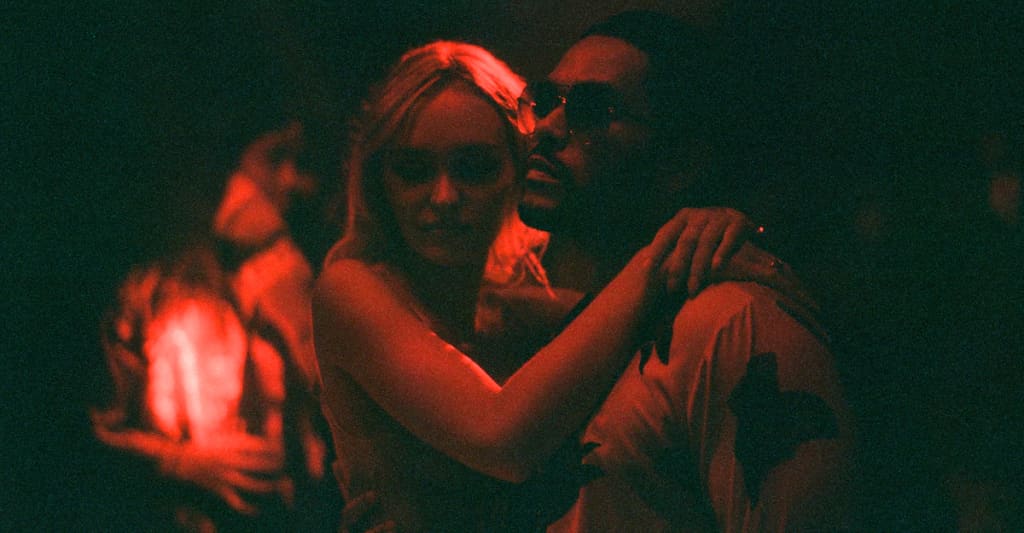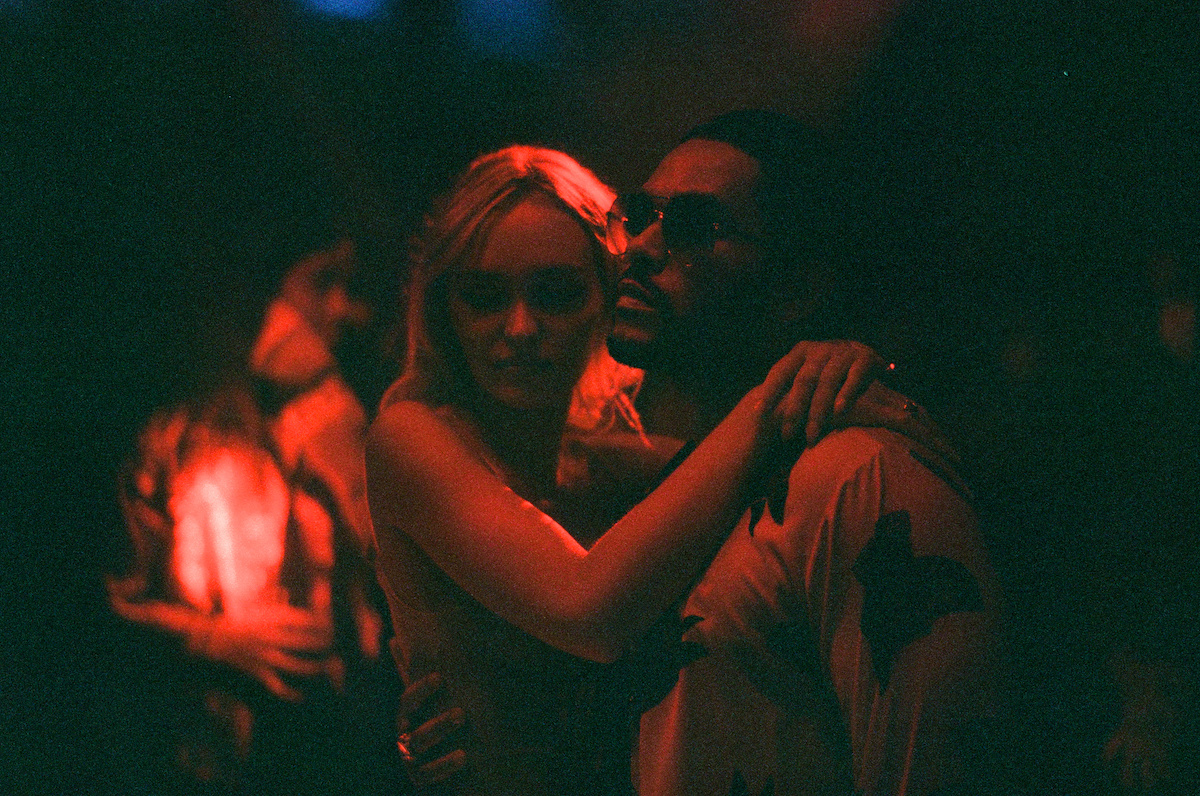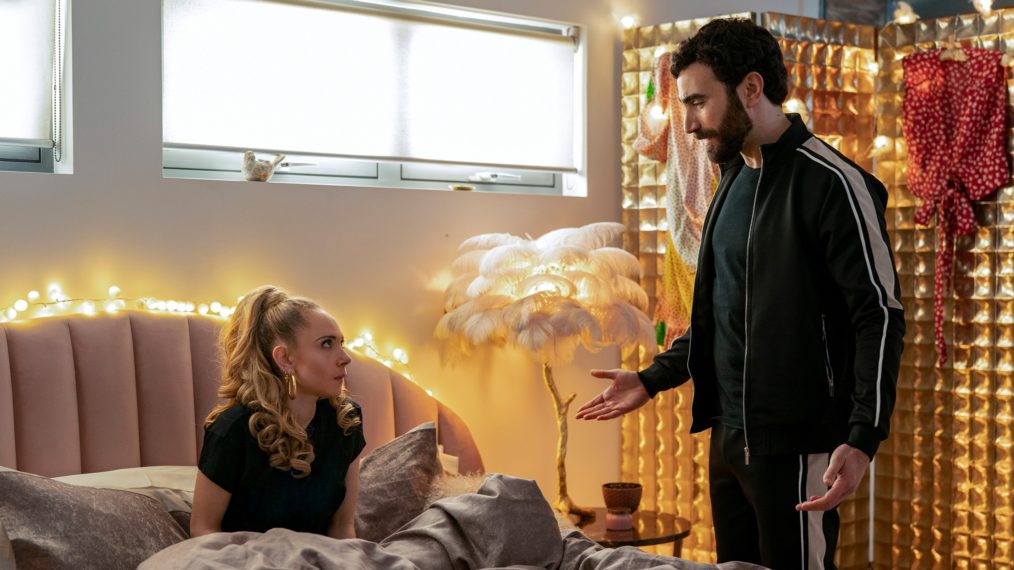#The Idol series review: Overheated, overhated, and finally over

Table of Contents
Sam Levinson and The Weeknd’s HBO series offered bog-standard provocation with one or two bright spots.

Lily-Rose Depp and The Weeknd in The Idol. Photo via HBO.
Spoiler alert: This review contains key plot points for the final episode of The Idol.
When it was first announced, The Idol seemed like a natural progression for the Weeknd. A series for HBO co-created by Reza Fahim and Sam Levinson, director and writer of the unwieldy smash hit Euphoria, was logical for the long-avowed cinephile born Abel Tesfaye, once an unhoused citizen of Toronto who would wander the aisles of indie video stores. The show’s subject matter was a fit, too: Jocelyn, a troubled pop star on the edge of career dissolution played by Lily-Rose Depp, falls under the sway of the Weeknd’s Tedros Tedros, music manager and sort-of cult leader; all this, set in the spawning pool of depravity that is modern Los Angeles. The Weeknd’s entire discography is a blow-caked showcase of excess with Tesfaye at the helm as its by-turns reluctant and indiscriminate anti-hero. Along with a cinematic flair found in his music videos and the intricate visual eras that made Tesfaye one of pop’s most compelling figures, everything about his association with the show tracked.
The Idol’s journey towards last Sunday’s finale was an ouroboros of controversy, allegations, and blowback. It began with a Rolling Stone report alleging a toxic and chaotic on-set environment where original director Amy Seimetz was constantly on her back foot with on-set rewrites and a budget too skinny to accommodate HBO’s lavish demands. Most explosively, RS claimed that Seimetz was fired over the Weeknd’s dissatisfaction with her direction; instead of documenting a troubled woman’s journey to personal empowerment, Tesfaye and Levinson were allegedly interested in something more degrading and with less focus on Lily-Rose Depp’s character. On-set sources described the show’s new path as “torture porn” and “rape fantasy.”
It’s fair to say that Seimetz’s departure and Levinson’s promotion — along with HBO’s kneecapping of one and indulging of the other — was The Idol’s first death rattle. If the Rolling Stone report is accurate, Seimetz’s marginalization by HBO, Tesfaye, and Levinson is both morally bereft and one of the biggest “what-ifs” in television this year. Seimetz is an exceptionally talented filmmaker — She Dies Tomorrow is one of the best American horror films in years — with television credits for shows like Atlanta and The Girlfriend Experience. Her portfolio surpasses Levinson’s in every aspect except viewership, and it’s hard to imagine her version of The Idol not doing so as well.
Tesfaye, Levinson, and Depp all pushed back on the claims, but Levinson said they made him more bullish on the show’s chances of success. After watching The Idol, it’s not difficult to imagine one of Jocelyn’s publicists, personifications of a cynical entertainment industry, saying this with a straight face. Still, the report had sparked a furor on the internet that could have, potentially, led to a significant audience. The show about a pop star in trouble got a news cycle that mirrored a real pop star in trouble. Fictional voyeurism begat real voyeurism. It was an unintentional feat of marketing that, if the show succeeded, would likely have been retconned as a plotted-out stroke of genius.
Of course, that’s not what happened. The Idol is a confused mess that bears the stress marks of its production. The very first episode shows a television playing Basic Instinct, Paul Verhoven’s 1992 smash starring Sharon Stone as a murder suspect who regards Michael Douglas’s investigating detective with a Great White’s demeanour. This inversion of traditional power dynamics (plus some hot sex) helped make Instinct a classic, but The Idol has little such craft. It is defined by broad-strokes music industry satire: characters yell cringey millennial “Fuckface VonClownstick” style vulgarities over each other as a Manson family scenario unfolds around them. The show’s trailer proclaims its creators as “sick and twisted,” and with a constant stream of tacked-on violence and unintentionally listless sex, The Idol itself wants desperately to be perceived that way. As each episode plods on, the basket of unfolded laundry in the corner of the room begins to look more appealing.
Levinson’s grating dialogue is not his only strained quality. As a filmmaker his style has an ill-matched luxury; beautifully lit and composed scenes sit next to each other like clashing pieces of designer clothing that, upon closer inspection, might be bootlegs. The weak narratives may be the point: Whether it’s a Jeffrey Epstein rape joke from Eli Roth’s vulgar, garish Live Nation rep Andrew Finkelstein or an expensive shot with no life outside of its borders, Levinson is chasing the next infuriated tweet and clipped GIF, relying on short bursts of content to spread the message of his work more than the work on its own.
The actors in Levinson’s TV shows, however, always end up elevating them. Euphoria brought out stunning and layered performances from a host of actors, and The Idol is no different. Lily-Rose Depp plays Jocelyn’s self-absorption with a kinetic range, dancing between fraying and wounded to composed and ruthless. Troye Sivan is Xander, a childhood friend of Jocelyn’s whose wounds are inexorably tied to her own and drag him further away from his humanity with each passing episode. And Tedros’ “Family” of musicians, a cast of supremely talented musicians (both in show and IRL) that includes Moses Sumney and Suzanne Son, are magnetic presences in every frame. Levinson seems to engender trust in the actors he casts, a significant factor in his success.
Tesfaye’s performance is also notable, and not because it’s his TV acting debut. In The Idol, the man who is a sex symbol off set plays a character who is the inverse. Tedros wears a rat tail and a Michael Cera in This Is Not The End windbreaker. He owns a club, and he’s the guy you’d most want to avoid there. What he lacks in charisma and self-confidence, he makes up in manipulation. He breaks down Jocelyn’s will, self-image, and autonomy in order to insinuate herself into her life, moving into her mansion with the musicians that make up his “Family” (the Manson allusions are not exactly subtle). If anyone in Jocelyn’s life poses a threat to his dominion, whether real or imagined, you can see the violence flash across his face before he acts on it.
There is nothing appealing about Tedros — a fatal flaw in The Idol’s construction as an erotic thriller, but a sign of how deeply Tesfaye immersed himself into his character’s oiliness. In episode 5, after Jocelyn has cast Tedros from her inner circle, Tedros sulks around the house, knocking back whiskeys and strung out on stimulants. Tesfaye looks like you could fry an egg off the heat of his brain’s hateful thoughts, and his performance in this episode is some of the best acting in the entire series.
But for every episode prior, the dissonance between Tesfaye the actor and the Weeknd seemed to be too much for the internet. Critics dismissed his acting ability and mocking memes were dispatched — at a certain point, I began to see people treat the character of Tedros as on par with a confession from Tesfaye. For all the torture and sex scenes that are spread across The Idol (they’re unpleasant, but they’re not exactly French New Extremity), the implications of statements equating Tedros and Tesfaye are far more disturbing.
The Idol begins with Jocelyn’s staff dealing with its own internet-driven crisis: a leaked intimate photo of Jocelyn. They frantically try to jockey for the advantage over the revenge porn, laying out tactics based on the landscape established by MeToo. There is a reflexive contempt at the heart of The Idol to some of the perceived excesses of modern discourse that has nothing to say beyond itself (It is in some ways a reaction to criticisms of Levinson’s Euphoria, which has faced scrutiny for its lingering focus on the sex lives of teenagers). The blow-up over Tesfaye’s character is just one example of the far more interesting and less well-trod territories surrounding these matters that a superior show could have explored.
The Idol’s inability to muster anything beyond misanthropy is best embodied in its treatment of power. Tedros is a narcissist who makes a group of talented musicians, including Jocelyn, believe that they need him. He degrades them, employing verbal abuse and degenerate assault all in service, he claims, of their music. If Jocelyn reenacts the childhood trauma of her mother hitting her with a hairbrush, Tedros reasons, she will access the heights in her art that she feels cut off from as a micromanaged pop juggernaut. She relents and ends up creating a song that she loves. Later, Jocelyn’s co-manager Destiny (played formidably by Da’Vine Joy Randolph) admits that while Tedros’ methods are troubling, he seems to have molded several individual musicians into stars.
The penultimate scene of episode six suggests that Jocelyn’s hairbrush story was a lie, and that she was the one manipulating Tedros all along. It’s a shaky device that doesn’t hold up scrutiny, completely unearned when considering the broader context of Jocelyn and Tedros’ relationship, and fails at melting away the artifice of Tedros the musical svengali. The appeal of the view that dehumanization has value if it contributes to great art endures in The Idol even as it makes gestures at pushing against it.
The strongest hint of what The Idol could have been was not a filmed scene. The Weeknd’s cover of John Lennon’s “Jealous Guy,” first heard during the fourth episode, is the most interesting creation related to the HBO series. The lyrics of the original song must have been disturbing even in 1971: Lennon begs forgiveness for unspecified injuries against his lover, blaming his suspicions and insecurities for causing him to cross the line. The discrepancies between the subject matter, how they’re delivered in Lennon’s weepy vocal performance, and the ornate-yet-tender composition are all unsettling, a feeling that’s heightened given Lennon’s very real history with domestic abuse.
This reckoning with Lennon’s legacy casts a menacing shadow over the Weeknd’s cover, co-produced into a spacey synth-driven ballad by hip-hop megaproducer Mike Dean. A proud and complicated product of discourse surrounding gender and violence, the Weeknd’s “Jealous Guy” excavates our love of beautiful art made by bad people, reflects our reliance on hypocritical moral codes, and relishes luxuriously in the discomfort it might cause us. In three and a half short minutes, it accomplishes everything that The Idol mostly fails at in five episodes.
If you liked the article, do not forget to share it with your friends. Follow us on Google News too, click on the star and choose us from your favorites.
For forums sites go to Forum.BuradaBiliyorum.Com
If you want to read more Like this articles, you can visit our Social Media category.




